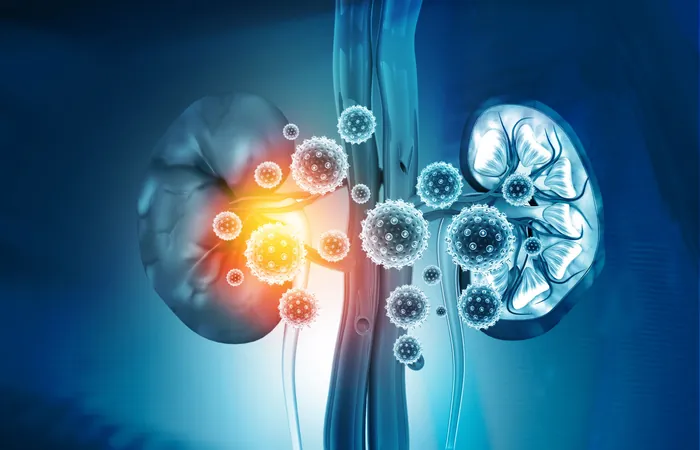
Revolutionizing Acute Kidney Injury Treatment: The Power of Mitochondria-Targeted Therapies
2025-09-01
Author: Amelia
Unlocking New Potential in Kidney Care
Recent breakthroughs in mitochondria-targeted therapies are poised to revolutionize the treatment of acute kidney injury (AKI), as revealed by groundbreaking research published in *Genes & Diseases*. The findings underscore the urgent need for further research to confirm these therapies' effectiveness across various models and to address any potential side effects.
Understanding Acute Kidney Injury
Acute kidney injury is a serious condition where the kidneys fail to filter waste from the bloodstream efficiently, causing harmful fluid and waste accumulation. Most prevalent in hospitalized patients, AKI can often recover but poses a lethal threat if not treated promptly. Symptoms, which might not always be apparent, include reduced urine output, swelling, nausea, fatigue, and shortness of breath.
The Link Between AKI and Chronic Kidney Disease
Emerging research suggests a cyclical relationship between AKI and chronic kidney disease (CKD), where AKI can lead to CKD, and severe cases of CKD further heighten the risk of kidney injury. Notably, patients undergoing dialysis for AKI face a heightened risk of long-term renal issues, including end-stage kidney disease—the final and most severe stage of CKD.
Targeting Mitochondrial Biogenesis as a Treatment Strategy
Given the significant global health challenges posed by AKI, innovative intervention methods are critical. One promising strategy is the enhancement of mitochondrial biogenesis—a cellular process vital for energy metabolism, stress resistance, and cell survival. By improving mitochondrial function, therapies could reduce oxidative stress and accelerate recovery in patients with AKI.
The Importance of Mitochondrial Function
The kidneys rely heavily on efficient mitochondrial function due to their high energy requirements. When AKI strikes, mitochondrial dysfunction leads to diminished energy production and increased cellular damage, worsening kidney injury. Enhancing mitochondrial biogenesis is essential for restoring cellular energy balance and improving patient outcomes.
Key Regulators of Mitochondrial Health
Several factors are crucial in regulating mitochondrial biogenesis, including PGC-1α, a key coactivator that boosts the expression of genes vital for mitochondrial function. Activating this pathway can enhance ATP production, curb harmful reactive oxygen species, and help cells survive stressful conditions. Compounds like resveratrol and novel small molecules have shown promise in promoting mitochondrial health by activating these pathways.
Navigating the Complexities of Mitochondrial Therapies
Despite their potential, regulating mitochondrial biogenesis is intricate; excessive activation might lead to detrimental effects like protein misfolding and cellular toxicity. Thus, achieving a delicate balance in stimulating mitochondrial health is crucial to minimize side effects. Personalizing treatments based on individual patient needs and specific AKI types is also essential for optimizing outcomes.
A Bright Future for AKI Treatments
Mitochondria-targeted therapies hold tremendous promise for improving AKI treatment. By tackling the root causes of mitochondrial dysfunction, these strategies could significantly enhance kidney recovery, slow disease progression, and ultimately save lives. Future research must focus on refining drug design, understanding biogenesis regulation, and conducting clinical trials to validate these innovative treatments.









 Brasil (PT)
Brasil (PT)
 Canada (EN)
Canada (EN)
 Chile (ES)
Chile (ES)
 Česko (CS)
Česko (CS)
 대한민국 (KO)
대한민국 (KO)
 España (ES)
España (ES)
 France (FR)
France (FR)
 Hong Kong (EN)
Hong Kong (EN)
 Italia (IT)
Italia (IT)
 日本 (JA)
日本 (JA)
 Magyarország (HU)
Magyarország (HU)
 Norge (NO)
Norge (NO)
 Polska (PL)
Polska (PL)
 Schweiz (DE)
Schweiz (DE)
 Singapore (EN)
Singapore (EN)
 Sverige (SV)
Sverige (SV)
 Suomi (FI)
Suomi (FI)
 Türkiye (TR)
Türkiye (TR)
 الإمارات العربية المتحدة (AR)
الإمارات العربية المتحدة (AR)